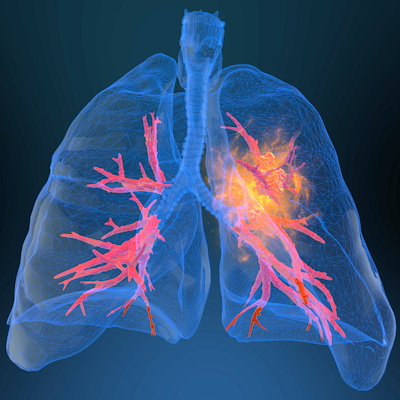February 8, 2023 -- Risk-based lung cancer screening is more cost-effective than the current model used in the U.S., a study funded by the National Cancer Institute (NCI) has found.
In 2021, the U.S. Preventive Services Task Force (USPSTF) recommended annual low-dose computed tomography screening of "adults aged 50 to 80 years who have a 20 pack-year smoking history and currently smoke or have quit within the past 15 years."
USPSTF adopted its approach after assessing the evidence on risk prediction models, which select people for screening based on their personal risk rather than solely on age and general smoking history. The task force found risk prediction models "might improve the balance of benefits and harms," but also saw "considerable uncertainty about how such approaches would perform in actual practice."
To inform future screening discussions, NCI funded a comparison of the cost-effectiveness of strategies based on risk models and the current USPSTF recommendation. The researchers published their findings in Annals of Internal Medicine.
The study used PLCOm2012, a model that estimates a person's six-year lung cancer risk based on their age and details of their specific smoking history, such as number of cigarettes per day. To determine the most cost-effective approach, the researchers analyzed the impact of starting lung cancer screening above PLCOm2012 six-year risk thresholds ranging from 0.5% to 2.2%.
The analysis revealed that screening at a risk threshold of 1.2% was cost-effective. Starting screening at the 1.2% threshold will deliver more quality-adjusted life years, a measure of the effectiveness of an intervention, for less cost than the USPSTF recommendation. Screening coverage was similar, with 21.7% of people captured by the risk model approach compared to 22.6% under the USPSTF recommendation.
According to the analysis, risk model-based strategies are "robustly more cost-effective than the 2021 USPSTF recommendation under varying modeling assumptions." Lead author Iakovos Toumazis, PhD, assistant professor of Health Services Research, outlined the implications of the research in a statement.
"Findings from this study could be considered as a potential guide for the development of cost-effective risk model-based lung cancer screening under various settings and availability of health care resources," Toumazis said. "While the current recommendations are cost-effective, our findings suggest that we can improve on these guidelines and provide more flexibility to include those most likely to benefit from lung cancer screening."
The study does not address all of USPSTF's concerns about risk prediction models. At the time of its 2021 recommendation, the task force also noted a need for research "on the benefits and harms of using risk prediction models to select patients for lung cancer screening, including whether use of risk prediction models represents a barrier to wider implementation of lung cancer screening in primary care."
Copyright © 2023 scienceboard.net










